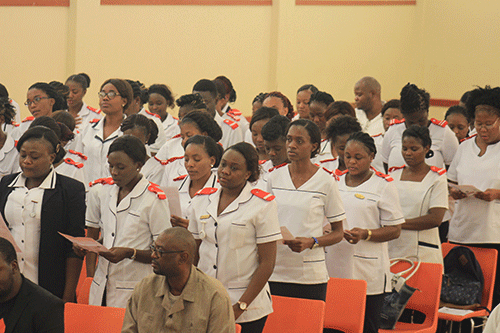World Health Organisation (WHO) Namibia representative Dr Charles Sagoe-Moses has said an effective Covid-19 response should include implementing strategies that can support health workers to provide high-quality care, while maximising the protection.
Sagoe-Moses made these remarks yesterday during the handing over of 462 000 surgical masks worth a little over N$2 million for frontline health workers by the WHO and the German embassy.
“Health workers play a vital role in keeping others safe, relieving suffering and saving lives. No country, hospital or clinic can keep patients safe unless its health workers are safe,” he said.
“Infections among health workers can lead to a depleted workforce at a time when they are most needed,” he added.
He said he knows that vaccination is part of a comprehensive approach to reduce the risk of severe Covid-19 while the use of masks, social distancing, keeping hands clean and ventilating spaces remains critical in reducing the risk of exposure to the virus.
“Ensuring the availability of personal protective equipment such as facemasks, among others, play a significant role in reducing the risk of transmission among health workers,” Sagoe-Moses added.
Of the 75 766 confirmed Covid-19 cases in Namibia as of Monday, 3 018 are infection among health workers.
Health workers represent less than 3% of the population in the large majority of countries and less than 2% in almost all low –and middle income countries, around 14% of Covid-19 cases reported to WHO are among health workers. In some countries, the proportion can be as high as 35%.
Meanwhile, Sagoe-Moses announced yesterday that the health ministry is working closely with the WHO to implement the WHO/AFRO II larviciding demonstration project, which is being implemented in five malarious regions.
The project, he said, aims at strengthening national capacities for implementation and scaling up of evidence-based, innovative, diversified and environmentally sound disease vector control interventions which particular focus on winter larviciding as an additional vector control tool to achieve malaria elimination.
To facilitate the AFROII project implementation, Sagoe-Moses presented a donation of 600kg of insecticide to be used for AFROII project larviciding as well as other equipment including IT equipment, laboratory equipment and supplies, protective clothing, mosquito collection equipment, biological freezer, bio larvicide worth N$900 000 to the ministry’s National Vector-borne Disease Control Programme.


